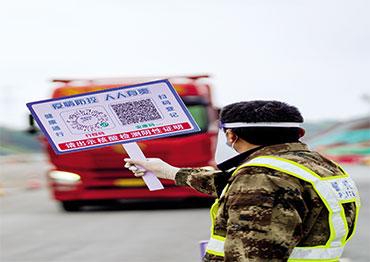Even before the pandemic, life for China’s truck drivers was difficult. Wen Xiang, a sociologist at the Renmin University of China in Beijing, told NewsChina that the rise of apps and e-commerce has reshaped the entire trucking industry.
While the adoption of big data, algorithms and cloud computing have greatly increased the industry’s efficiency, it has hurt truckers, who are mostly individual contractors with no strong union support.
In 2018, two of China’s most popular truck services platforms, Yunmanman and Huochebang, merged to become the Full Truck Alliance, controlling 90 percent of China’s market share. Truckers are left with minimal bargaining power, and have to compete for orders online.
Zhang Tao, a trucker from Wuhan, Hubei Province, told NewsChina that freight transport prices have been steadily decreasing. “In the past, a haul between Wuhan and Yichang (320 kilometers) would pay 1,600 yuan (US$236), but now, it only pays 800 to 900 yuan,” Zhang Tao said, adding that drivers are left to shoulder rising fuel prices and highway tolls.
According to Shen, a common sentiment among truck drivers is that the group has become increasingly marginalized both economically and socially over the past two decades. In the 1990s when China first liberalized its economy, trucking was among the best-paid blue-collar jobs, with many earning more than 200,000 yuan (US$29,500) a year, higher than many white-collar workers.
But after more than two decades, the income of most truck drivers has not increased along with China’s economic growth, sliding to less than 200,000 yuan. “We have a saying: ‘In the past, one truck could support the whole family, but now it requires a whole family to support a truck,’” Zhang Tao said.
Drivers complain they are not as respected as other high-risk essential workers, such as medical professionals. “Because of the pandemic, there are now strong prejudices against us,” Meng Yong told NewsChina.
For many drivers, the pandemic was the last straw. According to a report on the employment and status of truck drivers in 2021 conducted by the China Federation of Logistics and Purchasing (CFLP), the number of truck drivers in China sharply dropped from around 30 million in 2018 to about 20 million in 2021. Fewer truckers means those still on the road must work longer hours to keep the industry’s wheels turning.

 Old Version
Old Version



